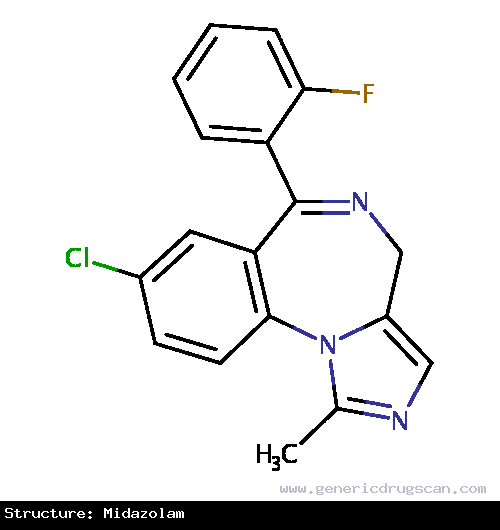Midazolam Drug: Indication, Dosage, Precaution, Side Effect , Storage, Category Type and corresponding Brands - www.genericdrugscan.com
Midazolam
Drug Status in USA : ApprovedDrug Status in Canada : Approved
pronunciation
pronounced as (mid' ay zoe lam)
Why is this medication prescribed?
Midazolam is given to children before medical procedures or before anesthesia for surgery to cause drowsiness, relieve anxiety, and prevent any memory of the event. Midazolam is in a class of medications called benzodiazepines. It works by slowing activity in the brain to allow relaxation and sleep.
How should this medicine be used?
Midazolam comes as a syrup to take by mouth. It is usually given as a single dose by a doctor or nurse before a medical procedure or surgery.
What are the precautions to be followed?
Before your child receives midazolam,- tell your child's doctor and pharmacist if he or she is allergic to midazolam, any other medications, or cherries.
- tell your child's doctor if your child is taking certain medications for human immunodeficiency virus (HIV) including amprenavir (Agenerase), atazanavir (Reyataz), darunavir (Prezista), delavirdine (Rescriptor), efavirenz (Sustiva, in Atripla), fosamprenavir (Lexiva), indinavir (Crixivan),lopinavir (in Kaletra), nelfinavir (Viracept), ritonavir (Norvir, in Kaletra), saquinavir (Invirase), and tipranavir (Aptivus). Your child's doctor may decide not to give midazolam to your child if he or she is taking one or more of these medications.
- tell your child's doctor and pharmacist what other prescription and nonprescription medications, vitamins, and nutritional supplements your child is taking or plans to take. Be sure to mention the medications listed in the IMPORTANT WARNING section and any of the following: amiodarone (Cordarone, Pacerone); aminophylline (Truphylline); antifungals such as fluconazole (Diflucan), itraconazole (Sporanox), and ketoconazole (Nizoral); certain calcium channel blockers such as diltiazem (Cartia, Cardizem, Tiazac, others) and verapamil (Calan, Isoptin, Verelan, others); cimetidine (Tagamet); clarithromycin (Biaxin); dalfopristin-quinupristin (Synercid); erythromycin (E-mycin, E.E.S.); fluvoxamine (Luvox); certain medications for seizures such as carbamazepine (Tegretol), phenobarbital, and phenytoin (Dilantin); methylphenidate (Concerta, Metadate, Ritalin, others); nefazodone; ranitidine (Zantac); rifabutin (Mycobutin); and rifampin (Rifadin, Rimactane). Your child's doctor may need to change the doses of your child's medications or monitor your child carefully for side effects. Many other medications may also interact with midazolam, so be sure to tell your child's doctor about all the medications your child is taking, even those that do not appear on this list.
- tell your child's doctor what herbal products your child is taking, especially St. John's wort.
- tell your child's doctor if your child has glaucoma. Your child's doctor may decide not to give your child midazolam.
- tell your child's doctor if your child has or has ever had kidney or liver disease.
- tell your child's doctor if your child is or may be pregnant, or is breast-feeding.
- you should know that midazolam may make your child very drowsy and may affect his or her memory, thinking, and movements. Do not allow your child to ride a bicycle, drive a car, or do other activities that require him or her to be fully alert for at least 24 hours after receiving midazolam and until the effects of the medication have worn off. Watch your child carefully to be sure that he or she does not fall while walking during this time.
- you should know that alcohol can make the side effects of midazolam worse.
What are possible side effects of this medication ?
Midazolam may cause side effects. Tell your child's doctor if any of these symptoms are severe or do not go away:- nausea
- vomiting
- rash
- agitation
- restlessness
- uncontrollable shaking of a part of the body
- stiffening and jerking of the arms and legs
- aggression
- slow or irregular heartbeat
Midazolam may cause other side effects. Call your child's doctor if your child has any unusual problems while taking this medication.
How to store the medication and dispose it of after its use later?
Drug Category/Class
- Anti-Anxiety Agents
- Anesthetics, Intravenous
- Adjuvants, Anesthesia
- GABA Modulators
- Benzodiazepine Derivatives
- Cytochrome P-450 CYP2B6 Inducers
- Cytochrome P-450 CYP2B6 Inhibitors
- CYP2B6 Inhibitors (strong)
- Combined Inhibitors of CYP3A4 and P-glycoprotein
- Hypnotics and Sedatives
- Nervous System
- Psycholeptics
- CYP2E1 Inhibitors
- CYP2E1 Inducers
- CYP2E1 Inducers (strong)
- CYP3
| Prescribed | The midazolam injection is indicated for preoperative sedation/anziolysis/amnesia. It is also an agent for sedation/anziolysis/amnesia prior to or ... |
| Weight : | 325.767 |
| Structure | Midazolam |
 | |
| Formula | C18H13ClFN3 |
Midazolam has 39 Brands listed
Search Generic Drugs alphabetically
